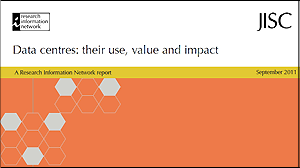Data centres: their use, value and impact
Posted: October 31st, 2011 | Author: Sven | Filed under: Report | Tags: Data Centers, Report, UK | Comments Off on Data centres: their use, value and impact This report provides an analysis of the usage and impact of a number of research data centres, representing a cross-section of research disciplines in the UK.
This report provides an analysis of the usage and impact of a number of research data centres, representing a cross-section of research disciplines in the UK.
The study aimed to demonstrate the importance, relevance and benefits of effective sharing and curation of research data for the UK research community. It looked at the long-term usage and impact of data curated by a cross-disciplinary selection of established data centres.
Using quantitative and qualitative approaches, the study gathered evidence on the extent data centres have been useful to the research community. As part of a wider body of work, this evidence will help to build a case for improving data sharing practice in the UK.
The full report is available at the RIN website or here.
Background
In recent years, the value of data as a primary research output has begun to be
increasingly recognised. New technology has made it possible to create, store
and reuse datasets, either for new analysis or for combination with other data
in order to answer different questions. In the UK, academic researchers, funders
and institutions have responded to these possibilities by supporting a number of
data centres – organisations with responsibility for supplying research data to the
academic community, and in some cases for collecting, storing and curating such
data as well.
Although researchers may choose to store and share their data in a number of ways,
data centres often appear to offer the best way of ensuring that data are preserved
and presented in a high-quality way, and made available to the largest number of
people. As dedicated, central locations for datasets, data centres are able to ensure
deposited collections are highly visible; in many cases, they also help ensure that
data are ready for reuse by helping researchers prepare them for deposit.
This study sought to understand usage of UK data centres among researchers, and
to examine the impact of such use upon their work. We undertook a series of initial
interviews with research funders to understand the role and importance of data and
data centres within various academic fields, followed by a survey of the users of
five data centres. Finally, through the interviews and surveys, a set of case studies
was identified where the data centre had benefited a researcher’s work, and in some
cases that work had gone on to have an impact in wider society. [Source]
Findings
Overall, usage of data centres is high, with most centres supporting thousands of
researchers and millions of downloads each year. Academics are the most significant
data centre users, and also the most important final audience for research based on
data centre assets. However, each centre in the study had a distinctive group of
users and audiences, which reflected its holdings and the funding streams within its
research field. Data from every centre is used in several ways: for original research,
for combination with other data, and for reference. In some centres, it is also used
as a basis for further data collection. Users of every data centre overwhelmingly
rated the data as important to their research.
Most researchers felt that data centres had improved the culture of data sharing
within their research field, either to a small or (in most cases) a large extent.
However, not all researchers submitted their own, new, data to data centres, with
clear differences between data centres observable in this area. More positively, a
majority of researchers cite the centre, the data set or the original creator when
reusing content in their own work.
The most widely-agreed benefit of data centres is research efficiency. Data centres
make research quicker, easier and cheaper, and ensure that work is not repeated
unnecessarily. Research quality was another important benefit, although not rated
quite as highly as efficiency. There was mixed evidence about the importance
of data centres in stimulating new research questions, with noticeable differences
between the data centres. Benefits to researcher training also varied significantly
between centres. [Source]







